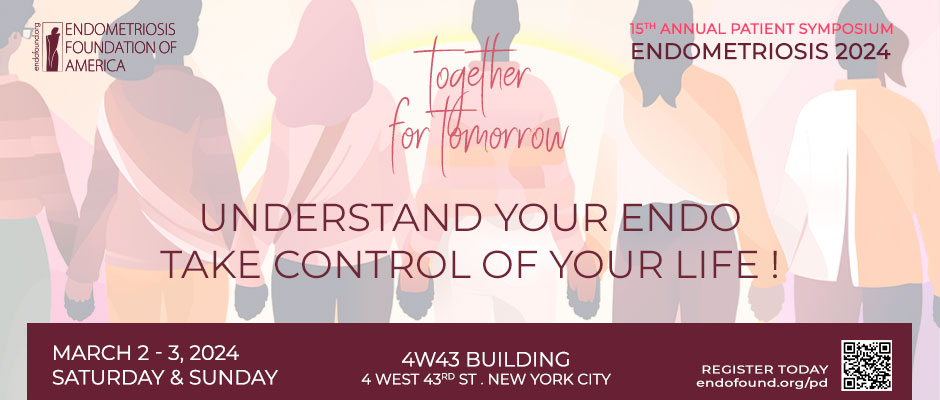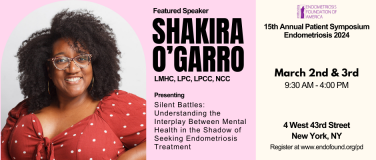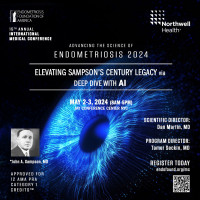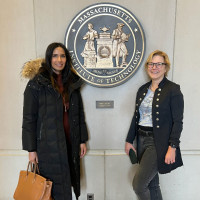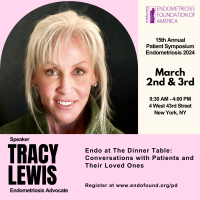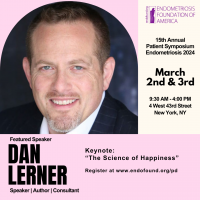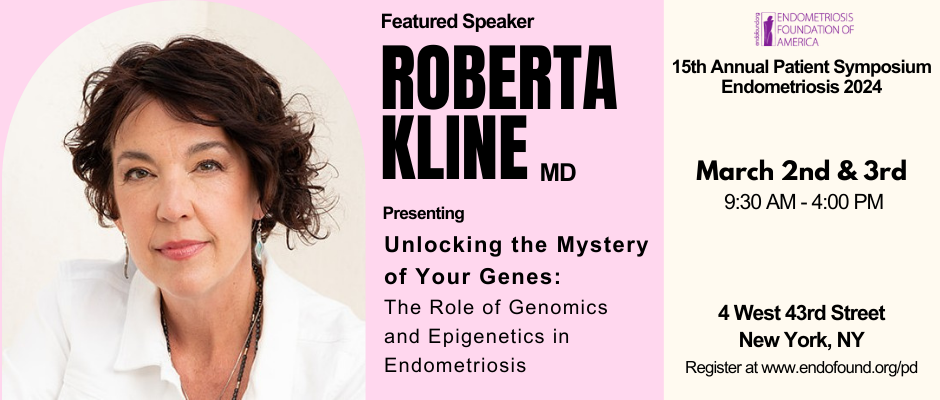
How old we are does not necessarily reflect the age of our body’s cells. While we cannot control the former, the latter—impacted by our environments, lifestyles, and experiences—is something we can control to an extent to improve our quality of life, even when dealing with a chronic disease like endometriosis.
Roberta Kline, MD, a researcher, educator, and passionate advocate for women’s health, will explain how in her presentation, “Unlocking the Mystery of Your Genes: The Role of Genomics and Epigenetics in Endometriosis,” at the 15th Annual Endometriosis Foundation of America (EndoFound) Patient Symposium on March 2 and 3 in New York City.
“Most people know that endometriosis is linked to hormones, but there are a lot of other biological systems involved,” Dr. Kline said. “I plan to give an introduction to the role of genetics beyond mutations, an overview in layman’s terms of what that science looks like, and what simple strategies women can implement in their lives to potentially improve their health.”
Dr. Kline was an OBGYN for 15 years before a shoulder injury ended her career. But that end was a new beginning, leading her to explore innovative ways to address personal health from the inside out, beginning with one’s DNA.
As Dr. Kline explained, genetics deals with mutations, which are changes in DNA that cause significant disruptions and risks of certain diseases. But she said most health issues people experience are not due to genetic mutations. They are caused by a different alteration in the DNA called Single Nucleotide Polymorphisms, or SNPs (pronounced “snips”).
“That’s what genomics is,” she said. “It studies the small changes in DNA that potentially alter one’s biochemistry but don’t typically directly cause disease.” However, as the body compensates for that alteration over time, disease can develop from the interaction of the SNPs with one’s environment, which can include relationships, stress, work, toxins, and trauma—elements of daily life that we can often control.
Dr. Kline said epigenetics is a newer layer of genomics coming into clinical practice.
“While you can’t generally change your DNA sequence (genetic mutations and SNPs), epigenetics are like little switches that turn genes on and off. They don’t change what the genes do in terms of the proteins they produce, but turning them on and off adds another layer of regulation,” she said. “So you could have a perfectly normal gene, but if the epigenetics has turned it off, it’s a problem.”
Dr. Kline said the beautiful aspect of SNPs and epigenetics is that they can be modified through diet, medications, and other lifestyle changes, which she will explain at the conference.
“My focus is on, ‘How can I help women feel empowered in their health?’” she said. “Knowledge is one thing, but if it’s knowledge you can’t do anything about, that just creates fear. How do we bring along knowledge with tools and strategies to make a difference?”
One of the most significant challenges women with endometriosis face is being properly diagnosed in a timely manner. Many aren’t diagnosed for a decade or more, usually because of the limitations in diagnosing the disease and a lack of education on it.
“The gold standard diagnostic modality for endometriosis is surgery. Imaging with MRI and ultrasound allow for noninvasive diagnostics. But the challenge is none of these modalities can detect it in all its forms,” Dr. Kline said. “I am grateful to be the educational director of the Women’s Health Collaborative (WHC), where our campaign for earlier detection includes identifying predispositions. Earlier detection allows for so many more options.”
Dr. Kline has spent significant time in her current career educating those who women with endometriosis and other diseases are counting on for help.
“There are pillars that conventional medicine does not look at, does not address, does not know about,” she said. “My goal is to not only educate women about some of the things causing their issues and what they can do but to educate the clinicians. If the clinicians don’t know, women will continue to get the runaround, and it’s a huge disservice to everybody.
“I believe the future of diagnostics lies in genomics and epigenetics, not just for endometriosis, but for many diseases we don’t have simple tests for,” Dr. Kline continued. “Through the WHC, we’ve been getting more into the community and conventional medical system to educate people. They don’t need to be experts in all these different modalities, but they need to be aware of it and come to it with an open mind. I’ve been in both worlds and understand the mindset, training, and realities of conventional practice, and I can tell you this science is not experimental anymore. It’s real, and it is changing how we approach health and disease. And healthcare needs to change, too.”
The 15th Annual EndoFound Patient Symposium will be from 9:30 A.M. to 4:30 P.M. on Saturday, March 2, and from 10 A.M. to 4 P.M. on Sunday, March 3, at the 4W43 Building, 4 West 43rd St. in New York City. For tickets, visit www.endofound.org/patientday.



